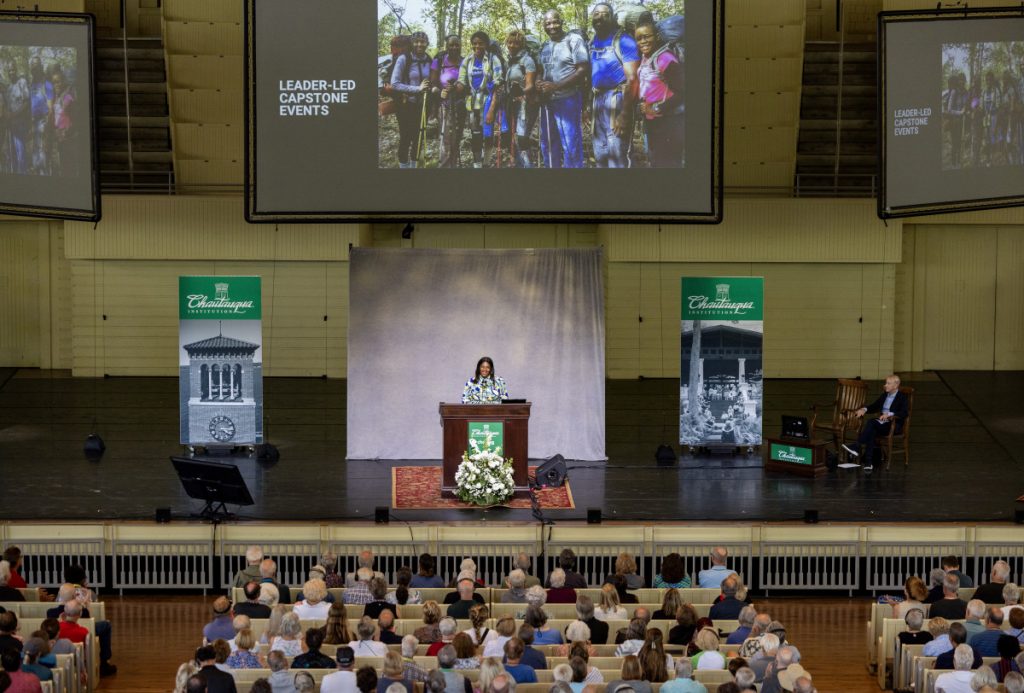
Alton Northup
Staff writer
Rue Mapp sees nature everywhere.
“Nature isn’t somewhere over there; nature is in us,” she said.
Mapp, the founder of Outdoor Afro and author of Nature Swagger: Stories and Visions of Black Joy in the Outdoors, discussed her mission to bring Black families outdoors in her lecture, which shared the title of her book, at 10:45 a.m. Wednesday in the Amphitheater to continue the Chautauqua Lecture Series Week Seven theme, “The National Parks: How America’s ‘Best Idea’ is Meeting 21st-Century Challenges.”
Mapp’s interest in the outdoors started as a family affair, she said. Despite living in an urbanized Oakland, California, her parents – hailing from Texas and Louisiana – ensured their family had a relationship with nature. Mapp recalled the family’s ranch 100 miles north of Oakland, a place where she could ride her bike on the country roads, see the stars at night, breathe fresh air and gather with family.
She was also a Girl Scout, and she journaled about her love for her troop members who, despite her family’s inclination for fishing, hunting and hiking, were the only ones willing to camp with her.
“Being in an all-girls group was incredibly empowering, and it started this longer journey of exploring the outdoors,” she said.
In 2009, Mapp found herself missing that connection to nature and sisterhood. She was recently divorced, raising three children and had just gone back to school to finish her degree. A mentor asked her what she would do with her life if money and time were not an issue; Mapp said she would start a website to reconnect Black people to the outdoors.
That year she launched Outdoor Afro using a Google Sites template, and she quickly found a community of people just like her.
“I recognized that we actually have a visual representation problem, as well as a narrative problem,” she said. “All of the people like me who thought that they were unicorns, that they were the only ones who looked like them in outdoor spaces — when you put us together, we were actually quite numerous.”
Mapp also noticed that nature programs often focused on engaging children, but felt the focus should be on Black women. They are the mothers, aunties and sisters who can get a community interested in nature, she said, but somebody had to reach them first. So, Mapp started the Outdoor Afro Leadership Team.
Twelve people made up the first leadership team, and they used their voices to engage others with nature. Now, the leadership team hosts capstone events each year, such as summiting Mount Kilimanjaro in Tanzania and hiking Harriet Tubman’s route on the Appalachian Trail.
“I think about Harriet Tubman as the ultimate wilderness leader,” Mapp said. “She got people through the cover of night to freedom.”
In many ways, Outdoor Afro continues Tubman’s mission, she said.
During the 2014 Ferguson unrest – a series of protests after a Ferguson, Missouri, police officer fatally shot Michael Brown – the sound of helicopters and hammers boarding up windows filled the streets of Oakland. Mapp asked herself what she, as the leader of a Black organization, could do to help.
Taking inspiration from Black tradition to “lay down our burdens down by the riverside,” she organized a healing hike. As the group reached the riverbank, she said she felt their stress leave their bodies.
“The trees don’t know that I’m Black. The birds are going to sing just the same for me as anybody else,” she said. “I think we can take the lesson from nature about how we are just beings, and how we can possibly see each other with that same kind of connectedness.”
Mapp said she also wants to redefine what nature means for Black people. Black children are six times more likely to drown than white children, she said. Outdoor Afro provides swimming lessons for free, as with every outdoor experience, to create equal opportunities for enjoying nature.
One of the reasons Black people may feel apprehension toward outdoor activities is because for much of American history nothing good came out of Black people going outdoors alone, Mapp said. Still, many Black people have managed to overcome segregated retreats – and even violent attacks in the woods – to find solace in nature.
“Even through that confined exclusion of getting into outdoor spaces, Black people still persisted,” she said. “There are places like Martha’s Vineyard, Oak Bluff, Lake Ivanhoe, Lincoln Hills – places where people found their joy and their justice in outdoor experiences.”




